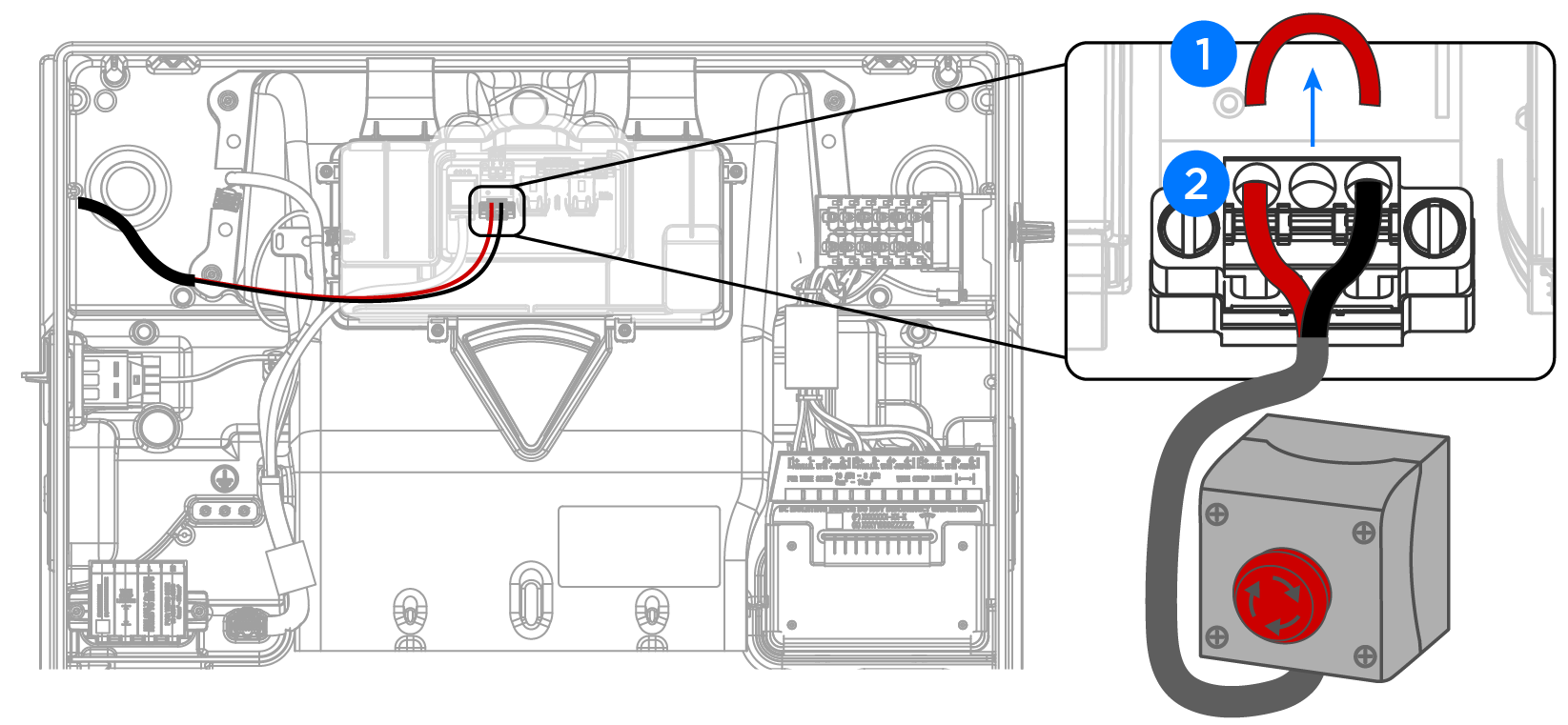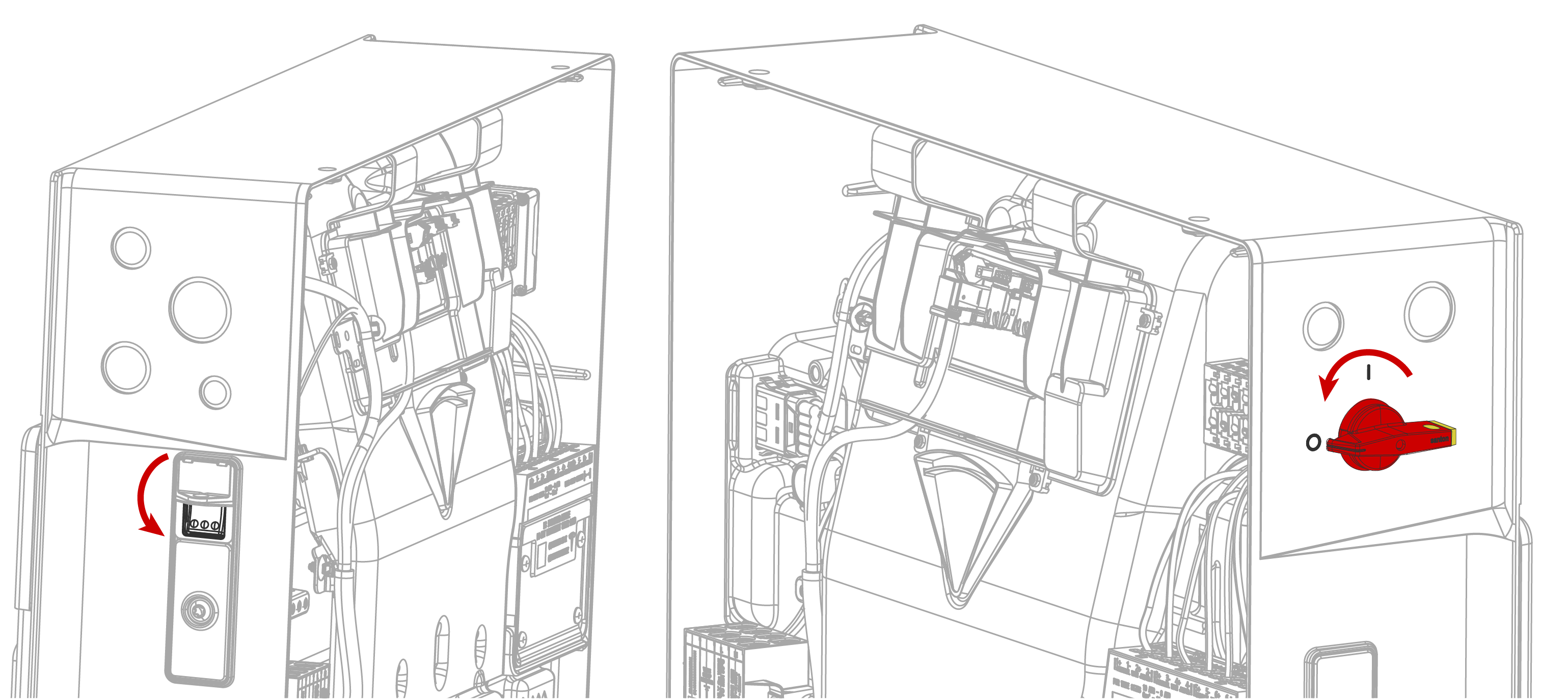Appendix E: (Optional) Install System Shutdown Switch
The Powerwall 3 On/Off switch is also a means of shutting the system down.
CAUTION
The System Shutdown Switch must be connected to Powerwall 3. Do not connect it to the Backup
Gateway 2, as it will not work.
Install the System Shutdown Switch
- Remove the factory-installed jumper from the System Shutdown + / - terminals on the Powerwall 3 System Shutdown connector. See Appendix B: Wiring Reference for a detailed wiring reference.
- Wire the 2-conductor
communication wire (minimum 0.25 mm2 conductors)
to the System Shutdown terminals:
- Strip the communication wire jacket so that it does not extend past the edge of the fan duct. This ensures the individual conductors lie flat, leaving room for the front cover to be installed.
- Strip each conductor 5/16 inch (8 mm).
- Route the two conductors
to the connector as shown below, using the wire management tab to
prevent them from blocking the Tesla Asset Controller.CAUTIONTesla recommends routing the communication wiring into the left side of the enclosure; always use the wire management tabs to ensure wires do not block the Tesla Asset Controller. Do not route loose wires through the front of the enclosure.
- Insert a cabinet tip or electronics tip slotted screwdriver (up to 3/32-inch or 3 mm) into each screwdriver slot to open the terminal.
- Insert each conductor as
far as possible into the terminal and remove the screwdriver from the
screwdriver slot to close the terminal.CAUTIONExcessive force may damage the connector; do not apply more force than is necessary to open the terminal and insert the conductor.
- Connect the 2-conductor
communication wire to a suitable DC switch (requirements below).

Switch Requirements
System Shutdown Switches shall meet the following requirements.
- Listed or Recognized as
"Emergency Stop Button", "Emergency Stop Device", "Emergency Stop Unit",
meeting one of the following standards:
- IEC 60947-1:2020 and IEC 60947-5-1
- BS EN ISO 13850:2015 - TC
- Rated for at least 12 V, 1 A
- Outdoor rated (IP 14 or higher)
- Terminals must accept 0.25 mm2 wire or larger
Recommended Switch Components
The following product (composed of all parts listed below) meets all above requirements for this application:
| Emergency Stop Button Option 1: Eaton | Eaton M22-PVT | Emergency Stop Button |
| Eaton M22-I1-PG | Emergency Stop Enclosure | |
| Eaton M22-K01PV6 | Emergency Stop Contactor Block (240V, 6A) | |
| Emergency Stop Button Option 2: Schneider | Schneider XALD01H7 | Emergency Stop Enclosure |
| Schneider ZB5AT84 | Emergency Stop Button | |
| Schneider ZB5AZ009 | Emergency Stop Collar | |
| Schneider ZBE102 | Emergency Stop Contact Block | |
| Schneider ZBZ1605 | Emergency Stop Guard Yellow | |
| Schneider ZBZ1602 | Emergency Stop Guard Black | |
| Low voltage communication wire (Powerwall 3 communication cable preferred) | ||
Installation Guidelines for the System Shutdown Switch
- Up to three Powerwall 3 units can be connected to a single System Shutdown Switch
- Installed externally in a readily accessible location, preferably near utility meter
- Maximum low voltage wire run from switch does not exceed 150 ft (45 m)
- Control circuit must be installed as Type TC-ER or within an appropriate raceway
